Culinary Literacy: Approaches and Programming Ideas
Liz Fitzgerald shares her experiences at the Culinary Literacy Center, Free Library of Philadelphia, with ideas you can implement at your library.
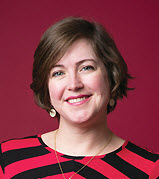 Liz Fitzgerald, a 2016 Library Journal Mover & Shaker, recently presented a WebJunction webinar focused on culinary literacy at the Free Library of Philadelphia (PA) where she is the administrator of the Culinary Literacy Center (CLC). The webinar details how the CLC has approached culinary literacy and provides inspiration and action steps to bring culinary literacy programming to your library.
Liz Fitzgerald, a 2016 Library Journal Mover & Shaker, recently presented a WebJunction webinar focused on culinary literacy at the Free Library of Philadelphia (PA) where she is the administrator of the Culinary Literacy Center (CLC). The webinar details how the CLC has approached culinary literacy and provides inspiration and action steps to bring culinary literacy programming to your library.
The library's mission is to "advance literacy, guide learning, and inspire curiosity," and the CLC's mission is to "advance literacy through food and cooking around a communal table." Both of which have guided the creation of many programs held at the CLC and throughout the library's branches.
The center itself is located on the fourth floor of the Parkway Central Library and was completely re-envisioned as part of larger renovations to the central library. What was once a cafeteria (that became a parking lot for weeded books) and an old meeting room space was redesigned to become the Culinary Literacy Center and includes a commercial grade kitchen classroom that hosts a wide range and high volume of programs for all ages. Since opening in June 2014, the center has reached 16,000 people.
Why a kitchen in a library?
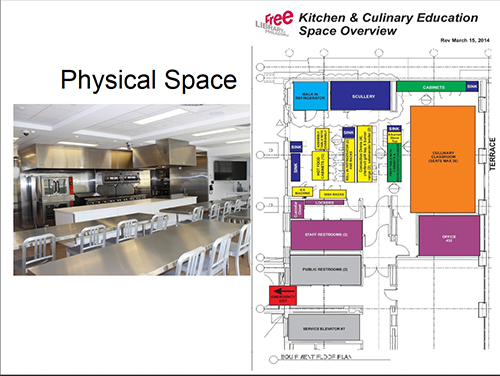 Fitzgerald addressed this common question, saying "I have heard it said that the library is the heart of the community. But recently, I heard a colleague say that the community needs to be the heart of the library. When you think about your home and our homes so often, the kitchen is really the heart of the home. When you have guests, I find—and I'm sure that you do too—that the kitchen is where everyone gathers. It's where we feed ourselves, it's where we feed our families. It's where we work together to make a meal and to sustain ourselves. The Culinary Literacy Center is the heart here in Parkway Central and helps to make the community really the heart of the library."
Fitzgerald addressed this common question, saying "I have heard it said that the library is the heart of the community. But recently, I heard a colleague say that the community needs to be the heart of the library. When you think about your home and our homes so often, the kitchen is really the heart of the home. When you have guests, I find—and I'm sure that you do too—that the kitchen is where everyone gathers. It's where we feed ourselves, it's where we feed our families. It's where we work together to make a meal and to sustain ourselves. The Culinary Literacy Center is the heart here in Parkway Central and helps to make the community really the heart of the library."
She added that offering culinary literacy programming has allowed the library the opportunity to think about who is in their community and how the library can offer new and innovative ways to reach out to their community. They have found at the Free Library that the audience is wide and varied, often people who haven't otherwise used the library. Participants are typically between 20 and 40 years old and often are a part of traditionally underserved populations.
Watch the webinar for advice and information you can use to make the case to your administration or board for culinary literacy at your library.
What is Culinary Literacy?
At the Free Library, culinary literacy takes many forms and is defined as a variety of subjects, some of which are:
- reading a recipe
- writing a recipe
- knowing the vocabulary of ingredients and cooking techniques
- understanding the math that goes into measuring and scaling a recipe up or down
- science of cooking
- knowing how to read and understand the implications of nutrition labels and what food does to the body
- consumer literacy: learning how to navigate grocery stores, corner stores and farmers markets
- understanding the technology that's used to access food information and food access points
- learning to prepare a meal
Ultimately, the focus of the CLC program is health and nutrition. "We found that over half a million Philadelphians are low literate, and over 60% adults are overweight or obese," explained Fitzgerald. "Nearly 50% of youth are overweight or obese. The numbers jump when you look at more impoverished areas." CLC programs address the issues of low literacy and health at the same time.
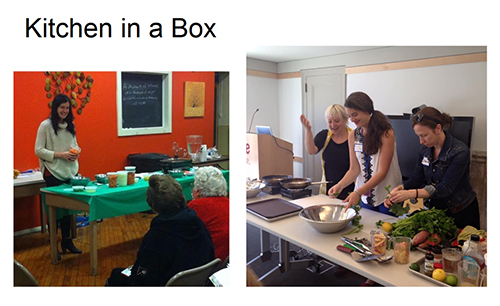 If you don't have a full demonstration kitchen, there are still many possibilities for offering culinary literacy programming. Fitzgerald suggests Kitchen in a Box, which only requires a folding table, an outlet, running water and cooking tools. The cost of the box is about $700. This handout (PDF) provides a full list of the items contained in the Kitchen in a Box, which what the Free Library uses when they do programming at their branches.
If you don't have a full demonstration kitchen, there are still many possibilities for offering culinary literacy programming. Fitzgerald suggests Kitchen in a Box, which only requires a folding table, an outlet, running water and cooking tools. The cost of the box is about $700. This handout (PDF) provides a full list of the items contained in the Kitchen in a Box, which what the Free Library uses when they do programming at their branches.
Watch the webinar recording for other creative and smaller scale options.
Fitzgerald said that many of their programs use the free, downloadable book Good and Cheap: Eat Well on $4/Day by Leanne Brown, which includes shopping tips and recipes designed to fit the budgets of people living on SNAP.
She also explained that 75% of their classes are plant-based/vegetarian, but that "I always want make sure that the programs are not prescriptive. I don't want to take a medical standpoint; I don't want to be seen as pushing some sort of food platform on people."
She added, "Everyone has their own personal food history, so we don't use good and bad as approaches. Instead we focus on offering people information so that they can make informed choices. I think that's what we do best as librarians. I've been thinking a lot lately about the concept that libraries are not neutral and I think that concept is really an important part of the programming we have chosen to do. The groups that we've reached out to and built programming around; it's a call that we make in terms of how we define our stance on the neutrality of libraries."
The webinar also covers safety and logistics (kids ages 10 and older get knives, "We believe in giving the best tools for the job, children included, and we instruct them in the proper ways to use them.") as well as where to look in your community for partners and collaborators (organizations with dieticians and food educators, state extension offices, hospitals, healthcare providers, local chefs, cookbook authors and more).
"The most successful programs we host foster an overwhelming sense of community." — Liz Fitzgerald
Program Ideas
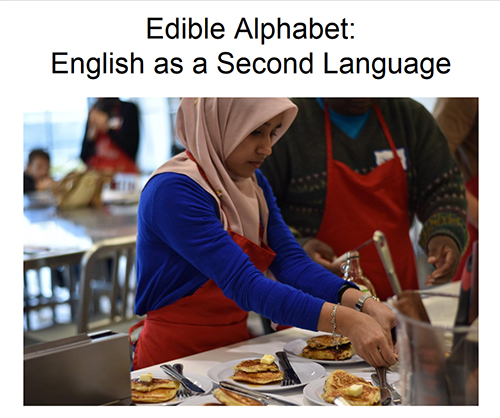 Free Library offers many programs, and Fitzgerald gave details about a few of their signature programs.
Free Library offers many programs, and Fitzgerald gave details about a few of their signature programs.
"The most successful programs we host foster an overwhelming sense of community," she says.
Nourishing Literacy: school classroom visit program with curriculum that connects to curriculum standards.
Edible Alphabet: a six-week program for English language learners that supports the library's strategic planning goal to support new Americans. All participants are refugees who collectively speak dozens of languages and at varying levels of English competencies.
Cooking with Confidence: a program for adults with developmental disabilities that teaches students basic cooking skills in a supportive learning environment.
As well as programs for veterans, people with low vision, and lots of options for children, families and adults. The adult programs focus on community engagement as well as health and range from free to $5 or $10 per event to up to $35 for special events with cookbook authors (that include a signed copy of the book).
More great ideas were shared by the live webinar participants in chat, including:
Rhonda Adams: "We are doing a series of cooking, nutrition, and food programs in conjunction with the Extension office's SNAP-Ed program."
Dianne Connery: "Information related to cooking/nutrition/gardening. We've started a community garden and nutrition/cooking classes focusing on families with low income."
Rita Aalbertsberg: "At Saucier Children's Library in Saucier, Mississippi, we have started a YA Teen Cafe on the 2nd Tuesdays of the month. We are teaching basic cooking skills like measuring, reading directions, and cooking from scratch."
Julie Brophy: "We're doing a month-long series in April with authors, local chefs, nonprofits working with hunger issues, career programs, etc."
Gwin Grimes: "We have recently started a cookbook club, and participants bring a dish to a potluck lunch/meeting; also, I teach some demo and some hands-on culinary classes. I am a state-certified culinary instructor (from my "former life"). I am looking to partner with our local food pantry to offer additional food literacy classes."
Watch the webinar recording and download the chat for even more information and inspiration!
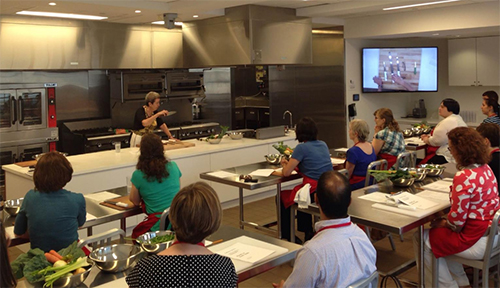
Watch the webinar Culinary Literacy: A Library Recipe for Cooking Up Literacy and Community for free at your convenience.
Access Recording
- View Webinar Recording (You will be prompted to log in to our free Course Catalog.)
Webinar Attachments
- View slides (pdf)
- View chat (xls)
- View captions (txt)
- Learner Guide (doc) Use alone or with others to extend your learning.
Related Resources and Links
- Liz Fitzgerald's feature: 2016 Library Journal Mover & Shaker
- Culinary Literacy Center (on Facebook and Instagram)
- Handouts: Kitchen in a Box List (pdf) and Waffle Fractions Program (pdf)
- Careers through Culinary Arts Program (CCAP)
- Pew Report Libraries at the Crossroads
- CDC information on health and nutrition literacy
- Leanne Brown's Good and Cheap: Eat Well on $4/day (pdf)
- Food Handler info from ServSafe
